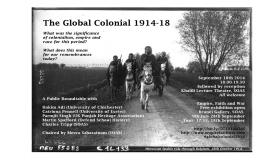The global colonial 1914-18

Workshop programme
Daytime workshop (20 participants), B204 (Brunei Building), 10.00-18.00
Registration and coffee: 10.00-10.20
Introductions: 10.20-10.30
Panel 1: 10.30-12.00: Race, Colonialism and the Outbreak of War
Discussant: Alex Colas, Birkbeck College, University of London
- The Colonial Armed Peace of 1914: Re-reading the Great War as a failure of imperialism: Luke Ashworth, Memorial University of Newfoundland
- “Nomadic” Imperialism on the Balkan Front and the question of race: Dušan I. Bjelić, University of Southern Maine
Lunch: 12.00-13.00
Panel 2: 13.00-14.30: Anti-Colonial Identity Production
Discussant: Robbie Shilliam, Queen Mary University of London
- “He May Be of the Homosexual Type”: Jodh Singh and the Construction of Ghadar Deviance in the Anglo-American Imagination during the First World War: Gajendra Singh, University of Exeter
- Ethiopia during Lij Iyasu’s reign (1913-1916): (multi)cultural policies, intellectual production and socio-economic reforms: Sara Marzagora, SOAS, University of London
Coffee: 14.30-15.00
Panel 3: 15.00-16.30: Re-learning 1914: Public Discourse and Pedagogical Transformations
- The ‘Global Colonial 1914-1918’ in the Classroom: Current limits and future prospects: Catriona Pennell, University of Exeter
- Empire, Faith & War: The Sikhs and World War One: Parmjit Singh, UK Punjab Heritage Association
- ‘IWM’s project: Whose Remembrance?: Reflections on an AHRC-funded project on the awareness of colonial troops in the two world wars’: Suzanne Bardgett, Imperial War Museum
Closing discussion: 16.30-17.15
‘Empire, Faith and War’ exhibition, Brunei Gallery: 17.15-18.00
Public Roundtable “The Global Colonial 1914-18”
(Khalili Lecture Theatre): 18.00-19.30, September 18 2014, SOAS
All welcome, no registration required
Re-thinking the Significance of Global Empires in WW1
The ‘war to end war’ which began in 1914 is conventionally remembered as a definitively European and nationalist affair, involving a war fought in France and Belgium to contain German militarism waged on the back of the common European conscript soldier. Yet, all the European states involved in the war were global imperial powers, exercising control over large swathes of the world and directly incorporating them into the conflict. Moreover, the objectives of the war were not simply to win in Europe but to maintain and expand colonial empires elsewhere. Battles took place from China to the Atlantic, from Mesopotamia to Mozambique, involving personnel gathered from as far afield as the West Indies, West Africa and Nepal. Not simply European and nationalist, therefore, the war was also both global and colonial in character.
Yet, colonized peoples often had other ideas and priorities about the key struggles of the time. Imperial powers faced various forms of resistance throughout the colonized world. Indigenous and cosmopolitan movements for sovereignty, home rule and racial equality evolved in dialogue with religious revivals, organised labour movements and revolutionary uprisings. And the experience of war itself disrupted, accelerated and re-ordered many of these dynamics, with lasting effects for the present.
In this public roundtable, our panel of experts will ask:
- What does it mean to say that 1914-18 was a global colonial moment?
- What was going on in the world outside Europe at this time?
- What kinds of impact did it have on the war and its aftermath?
- Who gets left out of our conventional stories of the war?
- How do we engage with these legacies in the UK, in the classroom and beyond?
Our speakers are drawn from a range of backgrounds and particular, our speakers will be looking at the political upheavals in the Middle East, the growing pan-African and anti-colonial movements, and the role of Indian soldiers in Europe. We will also be looking at the results of a recent study on the teaching of WW1 in the classroom and discussing the possibilities for a more inclusive history curriculum.
Speakers:
- Dr Hakim Adi, Reader in the History of Africa and the African Diaspora, University of Chichester
- Dr Catriona Pennell, Senior Lecturer specialising in 19th and 20th century British and Irish History, University of Exeter
- Parmjit Singh, Historian and Curator of the ‘Empire, Faith and War’ exhibition, UK Punjab Heritage Association
- Martin Spafford, retired school History teacher and member of Defend School History
- Professor Charles Tripp, Professor of Politics with reference to the Middle East, SOAS, University of London
Chair: Dr Meera Sabaratnam, Lecturer in International Relations, SOAS, University of London
Reception, Khalili Lecture Theatre: 19.30-20.30